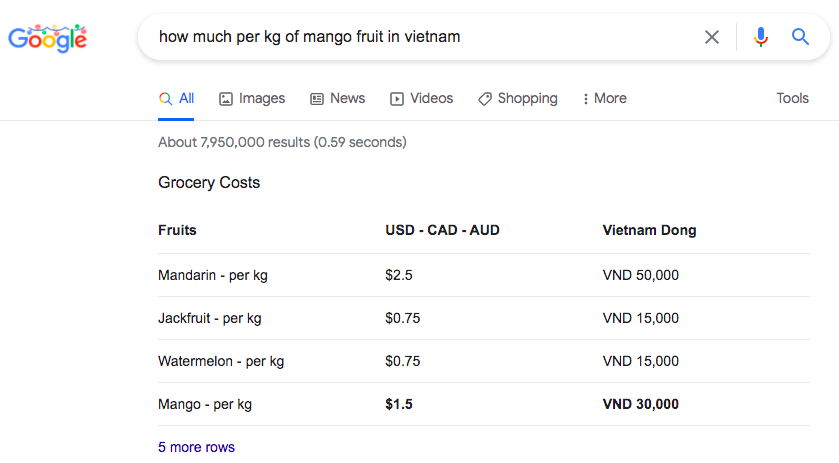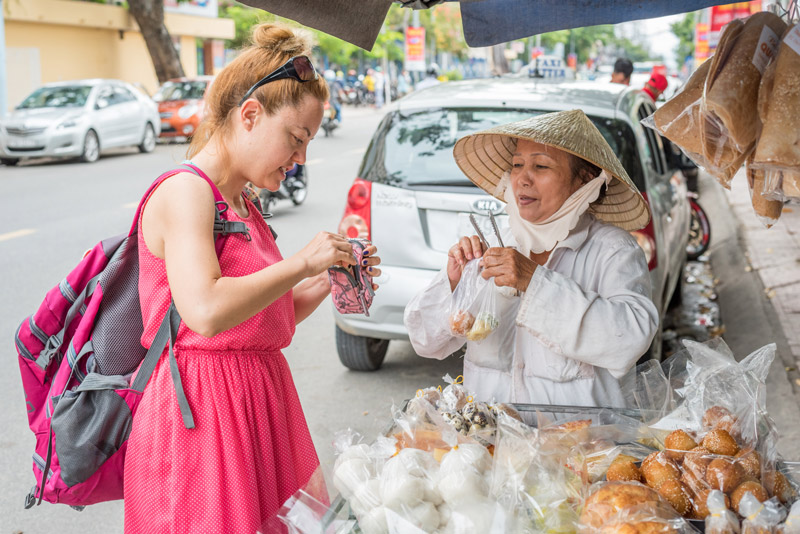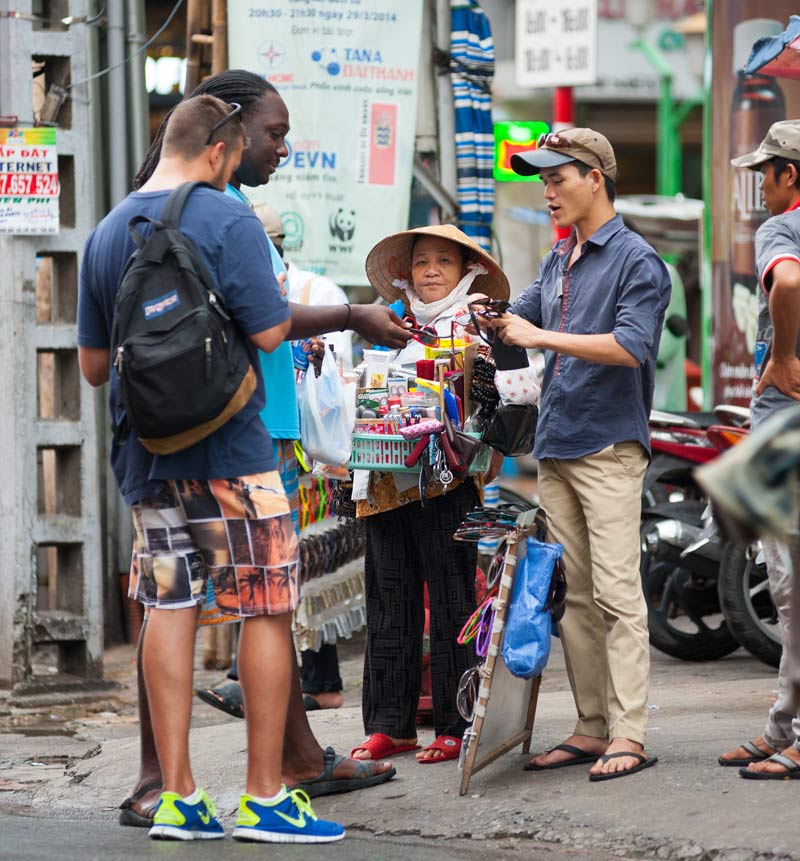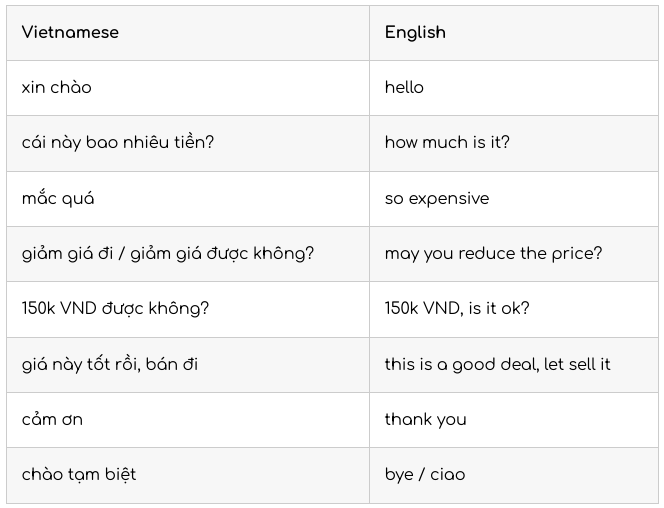Shopping from local vendors in Vietnam is a great experience even though you could have some dramas sometimes.
While supermarkets, restaurants, some stores have fixed price tags, other shops, street vendors or local markets don’t. The sellers here decide how much you need to pay, and sometimes they make up the price unreasonably.
Some of my international friends who plan to go to Vietnam next year (hopefully they can go) are very curious about this practice. They asked me “How to bargain in Vietnam like a local?”
Well, here we go!
During more than 27 years living in Vietnam from rural areas to the biggest city, I have experienced a lot of negotiating situations with Vietnamese vendors. Today I will share it all with you.
Disclaimer
Even if bargaining is fun and a cultural thing, you should always do it in a respectful and fair way, considering that making a decent revenue in Vietnam is not easy at all, especially for street vendors.
In addition, not all sellers make up the price. Be a great bargainer, not a shark! 🙂
1. Do a quick research in advance
In Vietnam, we have an idiom “Biết người biết ta, trăm trận trăm thắng”. It can be literally translated as “Master yourself master the enemy, hundred battles hundred wins”.
Like other negotiations, you need to know the market price for the item you want to bargain for and how much you are willing to pay for it. It’s a waste of time if you want to have the best deal but you have no idea what it should be.
That’s why you need to do a quick searching for what you plan to buy. For instance, if you would like to buy some mangos in the street, ask Google, you will have a result in a blink.

So now you know how much would be a great deal for fresh mango. It’s easy and very helpful.
2. Start with a suitable point

After having information on the price range thanks to your research above, you know where you are in this negotiation.
If the vendors offer you a fair price that is close to what you found, I guess you just go with it to save time for both you and the sellers.
But if you have no idea about the price and cannot find it on the internet at that moment, you should begin with a price where you could make a good deal at the end.
Normally you should start with a lower offer, around 40% to 50%, than the initial price. Sometimes the merchant makes up the tag very high, that’s why we need to bargain in Vietnam. In this case, don’t hesitate if you have to haggle for half of the price at the beginning.
From this point, try to be flexible to move up a bit to find a middle stop where you and the seller are both happy to close the deal.
3. Should not show too much passion during the haggling
It is more about emotion and body language to win the deal when you bargain in Vietnam.
If you expose so much love and desire for the item you want to buy, the seller would think that there’s a high possibility you’ll be willing to pay for it no matter its cost. Accordingly, they will try to keep the price as high as they can.
So, be calm and patient. Play step by step to see how vendors react and then you know what should be your next moves.
4. Good arguments are vital when bargaining in Vietnam

Haggling not simply playing with numbers on the price tag but also convincing sellers with great arguments. Whenever you would like to reduce the price, don’t forget to pack it with a good reason.
They can be a comment for the initial price such as “it’s too expensive”, or a comparison “I bought something like this last week, same material, same size, the price was just a half”, or “May you reduce a bit more? It’s still too expensive for me”, etc.
Depending on the specific context, try to make the conversation simple and easy. Believe me or not, but this is one of the experiences you should try while traveling in Vietnam
5. Bargain in Vietnamese
In some tourist places, local sellers can speak English. But if they can’t, you should equip yourself with some fundamental sentences and phrases in Vietnamese.
Besides, Vietnamese sellers would appreciate it if you make the effort to speak their language rather than English. Therefore, it would probably be easier on you during your negotiation.

These are just some basics. You can definitely enrich yourself with more vocabularies and sentences. Learning Vietnamese isn’t easy yet it can bring lots of fun.
Enjoy and good luck! 🙂
6. Don't hesitate to walk away
After some back and forth negotiating, if you feel it’s the best price you can pay but the seller hasn’t agreed yet, you should go away when you bargain in Vietnam.
This action shows that it’s the last chance for merchants to reconsider. If they do not go with it, they would lose a customer. It will therefore prompt the sellers to decide whether to sell or not.
In case of vendors still have a profit with what you propose, then, of course, they will try to keep you. Either they will bid you one last time or they will close the deal.
In case they can’t sell you at the price you suggest, you can buy the item somewhere else. It’s fair for everyone.
7. Be friendly and humorous during bargaining in Vietnam
If friendly and humorous are adjectives in your personality dictionary, it would be much easier for you to bargain in Vietnam.
From my personal observation, Vietnamese people seem to like international friends. Because you come from different countries, you speak a different language, you look different from us. We are curious about you!
“Well, it’s not really like that! They know that I’m am a tourist, I don’t know that much about things in Vietnam. So it would be a good chance for them to take money from my pocket” I assume you would have this thought now.
Well Yes and No!
Yes, because some Vietnamese people really did what you mentioned above. That’s why I’m now writing this article for you.
No, because the Vietnamese attitude towards foreigners is hospitable and warm-hearted. I couldn’t find any official research to prove it, but it’s what I’ve learned from my international friends, from the internet, and from myself.
So, this helps a lot when you bargain in Vietnam. Furthermore, as human nature, we prefer someone nice and smiling rather than grimace and scowl. I guess local vendors would prefer the same.
Besides, humor and wit are catalysts to facilitate you getting the deal better. Some funny jokes could break the barriers and let you into what you want quicker.
8. Remember you are a customer
In Vietnam, the customer is king.
Whenever you stop by a shop, it’s a huge chance for them to sell you something. That’s why they will not let you go unless you propose an offer they could not have any margin.
Local vendors need you and you have a demand for what they are selling. Bargaining in Vietnam is a win-win game. So if you follow the steps from 1 to 8 above, I really hope that you could have a good deal.
Over to you
Everyone has their own way to get the best deal. The above tips are just from my personal experiences. Of course, I am not an expert in bargaining, but I think these 8 steps would be helpful just in case you face a vendor who makes up the price unreasonably.
You might think it’s too complicated to shop in Vietnam as we need to be well prepared, be strategic and do a lot of steps.
It could be true yet it would bring you a lot of fun. Thanks to bargaining in Vietnam, you have a chance to talk with local vendors, discover different personalities and enjoy the rhythm of local trading.
On the other hand, it’s sometimes not necessary at all to haggle when the sellers offer a fair price. That’s why the first step “do quick research in advance” is important. It helps you know what should be your next moves.
I hope that this article brings you another angle of Vietnam. If you have some other tips to share about bargaining in Vietnam, don’t hesitate to let me know.
If you would like to stay updated with the latest content, ensure to subscribe to the AMA Vietnam blog today 🙂
